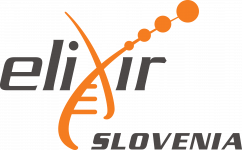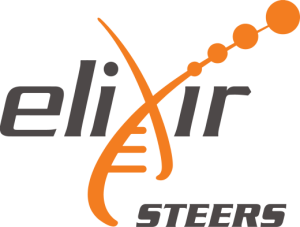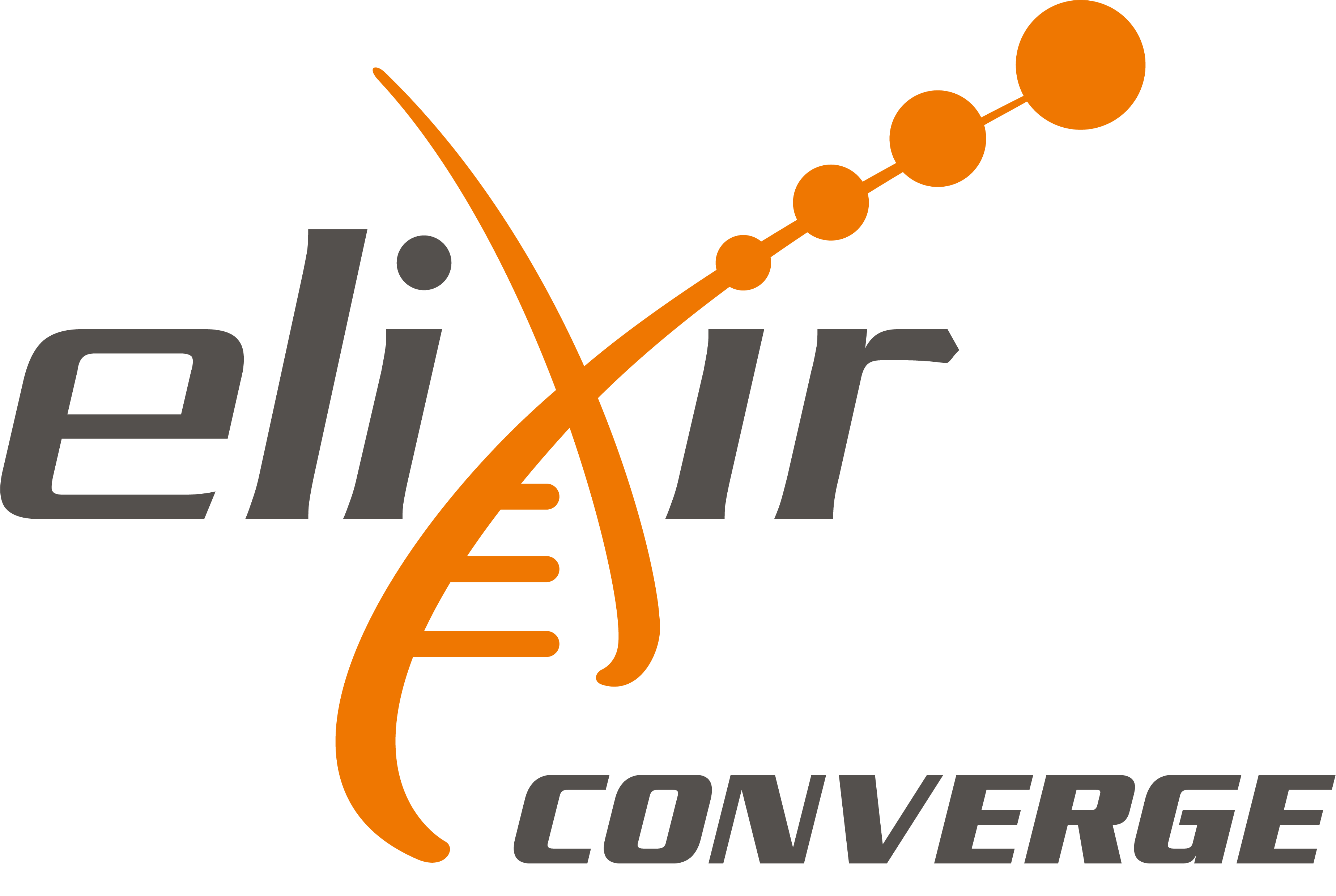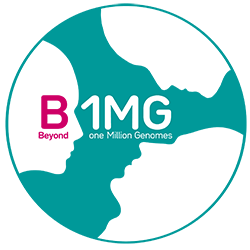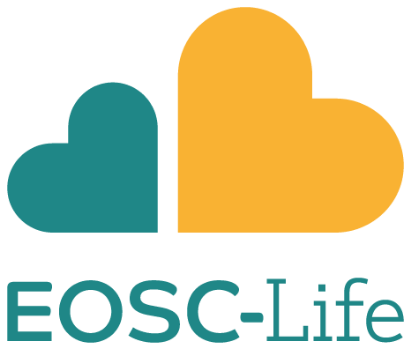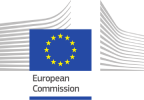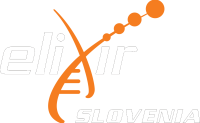ELIXIR-SI RI-SI-2 INFRASTRUCTURE PROJECT
At the end of 2019 ELIXIR-SI signed a contract with the Ministry of Education, Science and Sport for the development of research infrastructure for international competitiveness of Slovenian RDI area – ELIXIR-SI RI-SI-2 project.
The upgrade worth 5.26 million EUR was funded by European Regional Development Fund and the Ministry of Science, Education and Sports. The financing of the project was completed on August 31, 2021.
With these funds ELIXIR-SI actively upgraded the existing infrastructure and established new infrastructure in the Slovenian research area through three pillars:
- a central national data node for life sciences,
- national infrastructure for obtaining high-density data with high-throughput laboratory technologies (genomic technologies) and
- center for education and training in life sciences (usage of bioinformatic tools, analysis and services).
International
National
ELIXIR-STEERS
- The ELIXIR-STEERS project aims to assist researchers in accessing national data sets and conducting extensive cross-border data analyses from across Europe.
- It will promote good software management practices and support scientists in their software management needs.
- Grant agreement: 101131096
EOSC-ENTRUST
- EOSC-ENTRUST is a Horizon Europe project led by ELIXIR Hub at EMBL-EBI.
The project aims to create a European network of trusted research environments for sensitive data and promote European interoperability through collaborative development of a common blueprint for federated data access and data analysis.
- Grant agreement: 101131056
ELIXIR-CONVERGE
ELIXIR-CONVERGE is a project funded by the European Commission to help standardise life science data management across Europe. To achieve this standardisation, the project will develop a data management toolkit for life scientists. The toolkit will help ensure more research data is in the public domain, which will give scientists access to more data. This will allow them to discover new insights into the challenges facing society, such as food security and health in old age, and help stimulate innovation in biomedicine and biotechnology.
- ELIXIR-CONVERGE will develop the national operations of the research infrastructure to drive good data management, reproducibility and reuse. Over 36 months (+6 months extension) and with partners from all 23 Nodes, ELIXIR-CONVERGE takes the next step to create a European data federation where interconnected national operations allow users to extract knowledge from life science’s large, diverse and distributed datasets.
- Grant agreement: 871075
Beyond 1 Million Genomes
The Beyond 1 Million Genomes (B1MG) consortium will provide coordination and support to the 1+ Million Genomes initiative (1+MG), which is based upon the commitment of 21 European Member States and Norway that have signed the Declaration ‘Towards access to at least 1 million sequenced genomes in the EU by 2022’. Slovenia was in the group of first signatories. Collectively, all participating countries have committed to establishing a cross-border federated network of national genome collections associated with phenotypic data, consented for advancing health and medicine practices across Europe.
B1MG will go ‘beyond’ the 1M genome target and ‘beyond’ the 21 signatory countries. The project will collaborate with an array of international initiatives and consult a range of stakeholders to support the creation of a pan-European genome-based health data infrastructure, encompassing data quality and exchange standards, access protocols and legal guidance.
- Grant agreement: 951724
European joint programme on rare diseases – EJP RD
- The European Joint Programme on Rare Diseases (EJP RD) brings over 130 institutions (including all 24 ERNs) from 35 countries to create a comprehensive, sustainable ecosystem allowing a virtuous circle between research, care and medical innovation.
- Grant agreement: 825575
Personalised Medicine Center of Excellence – PerMedCoE
- PerMedCoE is a pan-European project coordinated by the Barcelona Supercomputing Center (BSC) and funded by the European Commission.
- PerMedCoE is based on exascale high-performance computing (HPC).
It will optimise codes for cell-level simulations and bridge the gap between organ and molecular simulations. - Important contribution to the European Personalised Medicine Roadmap.
- Grant agreement: 951773
EOSC Life
- EOSC-Life brings together the 13 Life Science ‘ESFRI’ research infrastructures (LS RIs) to create an open, digital and collaborative space for biological and medical research.
- The project will publish ‘FAIR’ data and a catalogue of services provided by participating RIs for the management, storage and reuse of data in the European Open Science Cloud (EOSC).
- Grant agreement: 8824087
ELIXIR Excelerate
- EXCELERATE funding (2015-2019) helped ELIXIR coordinate and extend national and international data resources to ensure the delivery of world-leading life-science data services. It supported a pan-European training programme, anchored in national infrastructures, to increase bioinformatics capacity and competency. It also provided efficiencies in management and operation throughout the infrastructure, which was distributed amongst 17 countries, including ELIXIR-SI.
- Grant agreement: 676559
Instand-NGS4P
- The Instand-NGS4P project will improve the treatment of cancer patients through the development of standard NGS workflows for clinical practice. Through open discussions with providers and field experts, the project partners will develop requirements for two standard NGS workflows, including a clinical decision support system to be used in clinical oncology practice.
- Grant agreement: 874719
IJS
- H2020 TAILOR – Foundations of Trustworthy AI Integrating Learning, Optimisation and Reasoning. PI: S. Džeroski. Project duration: 2020 – 2023
- H2020 FNS-Cloud – Food Nutrition Security Cloud. PI: N. Lavrač. Project duration: 2019 – 2023
- COST European Soil-Biology Data Warehouse for Soil Protection. PI: M. Debeljak. Project duration: 2019 – 2023
- H2020 AI4EU – A European AI On Demand Platform and Ecosystem. PI: S. Džeroski. Project duration: 2019 – 2021
- Data Mining and Decision support in Sustainable Food Production. PI: V. Kuzmanovski. Project duration: 2017 – 2020
- Learning models of diseases and treatments for systems and personalized medicine. PI: J. Tanevski. Project duration: 2017 – 2020
KIS
- ECOBREED: Increasing the efficiency and competitiveness of organic crop breeding, EU H2020 project, Grant agreement No. 771367, Project coordinator Vladimir Meglič, AIS; Project duration: 2018 – 2023
- Exploiting the multifunctional potential of belowground biodiversity in horticultural farming – EXCALIBUR, EU H2020 project, Project duration: 2019 – 2024
- Image analysis for early detection of quarantine plant pests – Root-knot nematodes and Cyst nematodes – NEMDETECT, EFSA project, Project duration: 2019 – 2022
NIB
- C3330-18-252004: EraCoBIoTech Indie; Indie – BioTechniological Production of Sustainable indole
- C3330-18-252003: EraCoBIoTech Susphire; Susphire – Sustainable Bioproduction of Pheromones for Insect Pest Control in Agriculture
- GA 824087: H2020 EOSC Life; EOSC-Life – Providing an open collaborative space for digital biology in Europe
- ADAPT: Accelerated Development of multiple-stress tolerAnt PoTato
UKCLJ CISLD
Innovative Medicines Initiative – Joint Undertaking (IMI-JU): INNODIA project
Endo-ERN
MetabERN
ERN RITA
ERN PaedCan
InterReg ITA-SLO project CATTEDRA
UKCLJ KIGM
-
Solve-RD – solving the unsolved rare diseases
UL MF
- B1MG (Beyond 1 Million Genomes), 1. 6. 2020, duration: 36 months, PI: B. Leskošek
- PerMedCoE (Personalised Medicine Centre of Excellence), Q1 2020, duration: 36 months, PI: B. Leskošek
- Infrastructure project ELIXIR-SI RI-SI-2, PI: B. Leskošek, Project duration: 2019 – 2021
- Instand-NGS4P (Integrated and standardized NGS workflows for personalised therapy), 1. 1. 2020, duration: 60 months, PI: B. Leskošek
- ELIXIR-CONVERGE (Connect and align ELIXIR Nodes to deliver sustainable FAIR life-science data management services), 1. 2. 2020, duration: 36 months (+6 months extension) from February 2020 to July 2023, PI: B. Leskošek
- H2020 TranSys # 860895. Precision Medicine at the Interface of Translational Research and Systems Medicine. PI: at UL MF D. Rozman. Project duration: 2019 – 2023
- LEAP – ELIXIR exchange grant (2020) between ELIXIR Slovenia and ELIXIR UK for implementation and development of Reactome. D. Rozman responsible for funds at UL MF.
UL VF
- Isolation, characterization and possibility of using exosomes from mesenchymal stem cells for advanced treatment of dogs. Project duration: 2019 – 2022.
- Stem cell transplantation into murine brain as a model for brain injuries and diseases treatment. Project duration: 2017 – 2020.
- Development of advanced cellular therapies to treat dementia in dogs. Project duration: 2017 – 2020.
IJS
- N2-0128: Automating the Synthesis and Analysis of Scientific Models. PI: S. Džeroski. Project duration: 2019 – 2022
- J7-1815: Restoration of moldy canvas paintings: improvement or deterioration? PI: P. Zalar. Project duration: 2019 – 2022
- J2-9230: Improving Reproducibility of Experiments and Reusability of Research Outputs in Complex Data Analysis. PI: P. Panče. Project duration: 2018 – 2021
- J7-9400: Neuropsychological dysfunctions caused by low level exposure to selected environmental pollutants in susceptible population – NEURODYS. PI: M. Horvat. Project duration: 2018 – 2021
- N2-0078: SDM-Open-SLO – Semantic Data Mining for linked open data. PI: N. Lavrač. Project duration: 2018 – 2021
- P2-0103: KT – Knowledge technologies. PI: N. Lavrač. Project duration: 2015 – 2021
NIB
- P4-0165: Biotechnology and Plant Sistems Biology. PI: M. Ravnikar. Project duration: 2015 – 2021
- J1-8142: Vibrational communication networks: from insects to plants. PI: M. Virant Doberlet. Project duration: 2017 – 2020
- J4-9302: Investigations of cell-cell communications in multicellular groups composed of different bacillus isolates. PI: I. Mandić-Mulec . Project duration: 2018 – 2021
- J4-1777: Unraveling mechanisms of effectiveness and specificity in potato immune signaling through innovative data acquisition and modeling. PI: K. Gruden. Project duration: 2019 – 2022
- Z7-1888: Deciphering structural and dynamical properties of plant response mechanisms with systems biology approaches. PI: Ž. Ramšak. Project duration: 2019 – 2021
UKCLJ CISLD
- P3-0343: Etiology, early detection and treatment of diseases in childhood and adolescence. PI: T. Batellino. Project duration: 2017 – 2021
- L7-8274: Immune and genetic markers and their impact on early detection and targeted treatment of systemic lupus erythematosus and related conditions. PI: T. Avčin. Project duration: 2017 – 2020
- J7-1820: Association of glycemic variability and DNA methylation patterns with early signs of retinal and kidney damage in individuals with type 1 diabetes. PI: N. Bratina. Project duration: 2019 – 2022
- J3-9282: Search for early epigenetic biomarkers of obesity-associated clinical complications in the pediatric population. PI: J. Kovač. Project duration: 2018 – 2021
- L3-9290: Sugars in human nutrition: availability in foods, dietary intakes and health effects. PI: I. Pravst. Project duration: 2018 – 2021
- J7-9411: The impact of acute hyperglycaemia on the activation of cognitive areas in the brain, on oxidative stress related gene expression and on epigenetic markers. PI: T. Batellino. Project duration: 2018 – 2020
- V3-1911: Slovenian genome project. PI: B. Peterlin. Project duration: 2019 – 2022
UKCLJ KIGM
- V3-1912: Development of Slovenian national hub for European reference networks. PI: L. Lovrečić. Project duration: 2019 – 2021
- J3-9280: Identification of novel genetic factors and mechanisms for neurodegenerative diseases using next-generation sequencing approaches. PI: A. Maver. Project duration: 2018 – 2021
- P3-0326: Gynecology and Reproduction: Genomics for personalized medicine. PI: B. Peterlin. Project duration: 2020 – 2025
- V3-1911: Slovenian genome project. PI: B. Peterlin. Project duration: 2019 – 2022
- Involvment in several National reference networks (ERN-RND, ERN-NMD)
UL BF
- P4-0077: Genetics and Modern Technologies of Crops. PI: J. Jakše. Project duration: 2019 – 2024
- P4-0220: Comparative genomics and genomic biodiversity. PI: P. Dovč. Project duration: 2020 – 2025
- J4-8220: Functional and structural analysis of Verticillium effector proteins and their targets in hop and model plants. PI: S. Berne. Project duration: 2017 – 2020
- J4-1778: Exploitation of a virus-borne small protein to combat antibiotic resistance in Staphylococcus aureus. PI: M. Butala. Project duration: 2019 – 2022
- J1-8150: DNA sampling II: a method for identification of directly or indirectly bound proteins at specific loci on bacterial chromosomes. PI. M. Butala. Project duration: 2017 – 2020
UL MF
- V3-1912: Development of Slovenian national hub for European reference networks. PI: L. Lovrečić. Project duration: 2019 – 2021
- V3-1911: Slovenian genome project. PI: B. Peterlin. Project duration: 2019 – 2022
- IP-022: Network of infrastructure Centres of University of Ljubljana (MRIC UL-ELIXIR). PI: M. Krajnc. Project duration: 2015 – 2021
UL VF
- P4-0092: Animal Health, Environment and Food Safety. PI: M. Ocepek. Project duration: 2020 – 2025
- P4-0053: Endocrine, immune and enzyme responses in healthy and sick animals. PI: M. Vrecl Fazarinc. Project duration: 2019 – 2024
- J4-1774: Use of probiotics to control contamination of poultry farms with campylobacters and salmonella. PI: M. Ocepek. Project duration: 2019 – 2022
- J4-9321: Improving immune response of animals against M. avium subsp. paratuberculosis and C. perfringens toxins with chicken egg yolk antibodies. PI: M. Ocepek. Project duration: 2018 – 2021
- J4-8224: Identification and characterisation of pathogens of infectious diseases with the method of next generation sequencing, participant. PI: I. Toplak. Project duration: 2017 – 2020
- J4-9436: Role of estrogens in active brain feminisation; and development of a novel hormone implant, mimicking estrous cycle. PI: G. Majdič. Project duration: 2018 – 2021
UM
- P2-0046: Separation Processes and Product Design. PI: Ž. Knez. Project duration: 2019 – 2024
- J2-1725: Smart Materials for Bioapplications. PI: Ž. Knez. Project duration: 2019 – 2022
- industrial project F4F
- industrial project AB FREE


